Week-end Trip, Day 2
This past week-end I went to the Western Region of Ghana, with our day guard Emmanuel to visit Vida’s ancestral village, as well as the village where his mother lives. This is day two.
See pictures from Day2
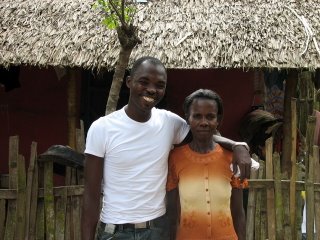 The plan for the day (or programe as it is known here) is to go visiting relatives, attend church (Emmanuel’s family is Seventh Day Adventist, so they worship on Saturday) and then in the evening, for Steve to deliver a lecture on Marriage, Families and Child Care. I have some serious reservations about giving such a talk, the greatest being that when one proclaims to be an “expert” on something, one invites trouble into their life. So while I may have a very good marriage and family, who needs trouble? So I have reservations about giving such a lecture. Another reason is that I think Ghanaians practice family life much better than we Americans. For example, here we are in the ancestral village of his wife, not far from the village of his mother, not far from the village of his ancestors, and he knows a lot of people, and they know him---by sight. “Adjie,” they say with this huge smile that seems to say “what are you doing here?” He has married the local girl, and now is a part of their family, and they know him.
The plan for the day (or programe as it is known here) is to go visiting relatives, attend church (Emmanuel’s family is Seventh Day Adventist, so they worship on Saturday) and then in the evening, for Steve to deliver a lecture on Marriage, Families and Child Care. I have some serious reservations about giving such a talk, the greatest being that when one proclaims to be an “expert” on something, one invites trouble into their life. So while I may have a very good marriage and family, who needs trouble? So I have reservations about giving such a lecture. Another reason is that I think Ghanaians practice family life much better than we Americans. For example, here we are in the ancestral village of his wife, not far from the village of his mother, not far from the village of his ancestors, and he knows a lot of people, and they know him---by sight. “Adjie,” they say with this huge smile that seems to say “what are you doing here?” He has married the local girl, and now is a part of their family, and they know him. I actually wonder if Mr. Emmanuel Adjie has some alternative motives for wanting me to talk about marriage, perhaps he wants me to lecture his wife about marriage, and has picked her home church as the venue. The Tuesday before we left I ended up doing some cross-cultural marriage counseling for them, something I know I am not qualified to do. It seems that he and Vida have were having a WarWa, which means very big fight, and in his anger he has said some things he regrets, and while he is at work (guarding my home), Vida has taken him up on those words, and moved out with their youngest daughter, Ruth. She has gone to stay with a sister in a part of town he does not know. After much WarWa, her kid brother, Cory, (remember Cory from day 1?), has delivered her to our house, and now I’m sitting in our living room, listening to their stories. Emmanuel just wants me to order her to come home, as the white man, authority figure, boss, and I won’t have anything to do with that, even for him. Crazy me, I think they should actually work things out, and apologize for unfortunate choices they have made. At the end of the day, Vida has moved back in, and the trip is back on and so here we are in her home town, going to visit relatives before going to church.
I actually wonder if Mr. Emmanuel Adjie has some alternative motives for wanting me to talk about marriage, perhaps he wants me to lecture his wife about marriage, and has picked her home church as the venue. The Tuesday before we left I ended up doing some cross-cultural marriage counseling for them, something I know I am not qualified to do. It seems that he and Vida have were having a WarWa, which means very big fight, and in his anger he has said some things he regrets, and while he is at work (guarding my home), Vida has taken him up on those words, and moved out with their youngest daughter, Ruth. She has gone to stay with a sister in a part of town he does not know. After much WarWa, her kid brother, Cory, (remember Cory from day 1?), has delivered her to our house, and now I’m sitting in our living room, listening to their stories. Emmanuel just wants me to order her to come home, as the white man, authority figure, boss, and I won’t have anything to do with that, even for him. Crazy me, I think they should actually work things out, and apologize for unfortunate choices they have made. At the end of the day, Vida has moved back in, and the trip is back on and so here we are in her home town, going to visit relatives before going to church.The villages we are going to are about 20 minutes away by dirt road, except the dirt road has washed out and is being repaired that day, so we take the long way around, about an hour. Church is at 10am, we leave to go visiting about 8:30am, and each visit takes about an hour and even I can see it isn’t going to work out.
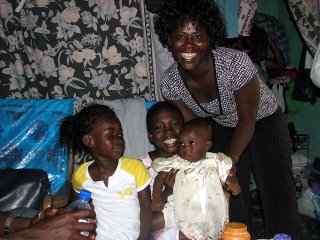 We go to the first village, Ayem, to meet Vida’s elder sister. Most of the transactions are in Twi, and so I really have no idea what is being said other than the occasional obrunie, or Methodist, which I can pick out. Twi is a funny language in that they freely mix in English words, like numbers, or western concepts that have no Twi word equivalent. The general form is to be invited into a house, and to sit down. If there is a place of honor, I am directed to sit there, if there is a fan, it gets pointed at me. Immediately someone will ask, “What is your mission?” and one of us is expected to go into a narrative about what has brought us to this point in our journey. Later Vida’s father explains to me that they ask this so the people will know if you are being persued, so they may hide you under their bed if necessary. When the narrative is done, everyone shakes hands, snaps, and bottles of cokes appear. I am the only one who is not expected to share my coke, and the conversations really begin.
We go to the first village, Ayem, to meet Vida’s elder sister. Most of the transactions are in Twi, and so I really have no idea what is being said other than the occasional obrunie, or Methodist, which I can pick out. Twi is a funny language in that they freely mix in English words, like numbers, or western concepts that have no Twi word equivalent. The general form is to be invited into a house, and to sit down. If there is a place of honor, I am directed to sit there, if there is a fan, it gets pointed at me. Immediately someone will ask, “What is your mission?” and one of us is expected to go into a narrative about what has brought us to this point in our journey. Later Vida’s father explains to me that they ask this so the people will know if you are being persued, so they may hide you under their bed if necessary. When the narrative is done, everyone shakes hands, snaps, and bottles of cokes appear. I am the only one who is not expected to share my coke, and the conversations really begin.Have I told you about Ghanaian hand shakes? In the course of a typical conversation I’ll shake hands five or six times. It starts with a western handshake, then moves to a brother handshake, and then back to the western one, and then we carefully arrange our middle fingers so that we release, we can snap our fingers in unison, and if we mess up, we’ll try again.
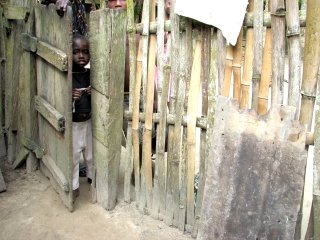 The next town we visit is Trebuom. Trebuom is down another dirt road and is the town that Emmanual’s mother lives in now, and the one Vida was born in. Her grandmother still lives there, her mother died years ago. On the way to Treboom we see a Palm Wine Tapper, and stop and get out to examine the process. Palm Wine is a sweet wine that comes from the sap of the palm tree. They uproot the tree down, let it sit for a week and then make a square funnel shaped hole near the top, and a hole on the bottom in which the sap drips out. The sap is collected in gallon jugs, the jugs are poured into 50 gallon drums (previously oil drums), and then allowed to ferment for a week.
The next town we visit is Trebuom. Trebuom is down another dirt road and is the town that Emmanual’s mother lives in now, and the one Vida was born in. Her grandmother still lives there, her mother died years ago. On the way to Treboom we see a Palm Wine Tapper, and stop and get out to examine the process. Palm Wine is a sweet wine that comes from the sap of the palm tree. They uproot the tree down, let it sit for a week and then make a square funnel shaped hole near the top, and a hole on the bottom in which the sap drips out. The sap is collected in gallon jugs, the jugs are poured into 50 gallon drums (previously oil drums), and then allowed to ferment for a week.Emmanuel, Anna, Ruth and Vida all sample the milky palm wine; I’m not that brave, so they give us a bottle to taste later, but over the night it exploded (the fermentation process was still very active). It takes 8 trees to fill a 50 gallon barrel, he tells me, and there are 250 trees in this area to be harvested.
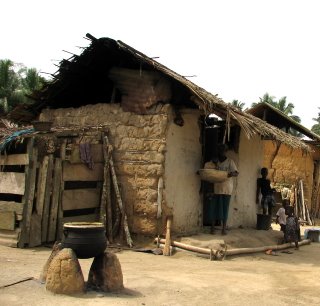 Trebuom does not have electricity, and so the village you see is different than many of the other villages we will visit. The huts are mud and bamboo instead of concrete, and there are not power poles connecting a web of wires strung haphazardly overhead. There are no TV antenna stretching to the sky on tall bamboo polls. The government has plans to move the town five miles down the road, halfway between the towns of Mpoho and Bopp. When the town has moved, they promise a regional hospital and to bring power (“light”) to it, but until then, it remains unchanged. We visit Emmanuel’s mother and her husband, along with Vida’s grandmother and her aunts. While Vida is talking, the village children take us to the cocoa plantation, and we pick cocoa pods. Vida gives me some drying cocoa beans to taste, and Ruth shows me how to eat them. Yes, it takes like (bitter) cocoa, wow!
Trebuom does not have electricity, and so the village you see is different than many of the other villages we will visit. The huts are mud and bamboo instead of concrete, and there are not power poles connecting a web of wires strung haphazardly overhead. There are no TV antenna stretching to the sky on tall bamboo polls. The government has plans to move the town five miles down the road, halfway between the towns of Mpoho and Bopp. When the town has moved, they promise a regional hospital and to bring power (“light”) to it, but until then, it remains unchanged. We visit Emmanuel’s mother and her husband, along with Vida’s grandmother and her aunts. While Vida is talking, the village children take us to the cocoa plantation, and we pick cocoa pods. Vida gives me some drying cocoa beans to taste, and Ruth shows me how to eat them. Yes, it takes like (bitter) cocoa, wow!The longer we are in Trebuom, the more children follow us around. They will stay just out of reach, and their eyes watch me. Anna and Ruth snuggle, and rub my hairy arms, the village kids are fascinated, and it seems that everyone in the village comes by to have a look at the obrunie. We follow the usual format, what is your mission, cokes, shake hands again, snap, and then they talk. I smile and play with the kids and try to shake their hands, but they will have nothing to do with me, except to stare. It is now 11:30am, and church service we were planning to attend is well over, I think.

At noon we head back to Mpoho, and by 1:30 we are back, where we change into church cloths, long pants, long sleeve shirt and a tie. It is too hot for this, I think. All the way back Emmanuel has been fielding calls from the people at the church asking where we are. He is exasperated, and confesses he thought the visiting would take no more than an hour and here it has taken over four. In the original plan, he was to preach that Sunday in church, but for some reason that plan has changed and it is a good thing, since we missed church, but not the Harvest. They waited until we arrive before starting the Harvest.
church, but for some reason that plan has changed and it is a good thing, since we missed church, but not the Harvest. They waited until we arrive before starting the Harvest.
Harvest is a quarterly event in the local churches here. It is a fund raiser in which several churches will gather to help each other out. A well-to-do person is selected as the chairman, and about 30 others are on the committee. As far as I can see, these are figurehead positions for this particular Sunday. Some churches auction off produce that people have brought from their farms and gardens, but this afternoon it is more of a talent show of different groups of people getting up and singing in incredibly tight four part harmonies. Of course, I have my guitar and so I sing too. During the singing people come forward and put money in a bucket. Sometimes people dance all the way up there and make a great show of putting money in the bucket, other time they is like what I imagine I would be like, embarrassed.
The first time I am introduced, and I sing the song, Meet With Me, a fun little ditty, and then I sit down and listen as there is more speaking, and a few other groups perform, including the chairman, who is actually quite good. The congregation is not what I had expected, mostly children from 5 to 18, and then a group of parents, and about 30 other adults who are part of the committee. They are expected to get up and contribute from time to time. Vida is elsewhere, visiting with family I guess.
The first time I sing, the congregation doesn’t know what to do with me. The second time, I am introduced again, and I bring them greetings from Texas and the US. I sing a song about marriage that Suzanne and I wrote when I was in seminary (Kelly & Melina's Wedding Song). They are clapping and I hear people harmonizing on the refrain. I sit down, and later I am introduced for the third time. Emmanuel and I are having a discussion.
“I don’t think this talk is the one I’m supposed to give,” I say, pointing to the prepared talk on marriage. “These children,” I tell them, “they are too young to be married.” “But Mr. Steve they have already announced that is what you will speak on.” We go back and forth, and then he says to tell them that this is what God has laid on my heart to share with them.
This Adventist church has gathered with another church called Trumpet, and together they are doing a Harvest to raise money for a building. Right now we are meeting in an outdoor school assembly hall. So when I am introduced again, I tell them about Foundation, and how it was just four years ago that we moved into our first building, and how I look forward to the day when you will have a church building of your own. I begin the prepared text, going into God, Family and Everything else, before launching into The Emergency Sermon.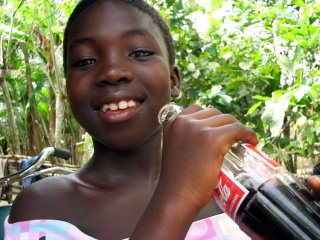 “As a missionary kid,” an MK once told me, “You must be ready to pray, preach or die at a moment’s notice. Since I’m not a missionary, then all I have to be ready for is to pray and preach, and so like most preachers I know, I always have an emergency sermon in my brain, ready in a moment’s notice just in case we need to break the glass and use it. For me this sermon’s latest incarnation was called God’s FAQ, or Frequently Asked Questions, but the twist is that it is God who asks us the questions. It’s a pretty generic sermon that can be adapted to many situations and uses the Bible to ask people to self examine their lives to see how God could use them. I can’t tell you the number of times I’ve had to pull out this sermon, and today, I am glad I have it.
“As a missionary kid,” an MK once told me, “You must be ready to pray, preach or die at a moment’s notice. Since I’m not a missionary, then all I have to be ready for is to pray and preach, and so like most preachers I know, I always have an emergency sermon in my brain, ready in a moment’s notice just in case we need to break the glass and use it. For me this sermon’s latest incarnation was called God’s FAQ, or Frequently Asked Questions, but the twist is that it is God who asks us the questions. It’s a pretty generic sermon that can be adapted to many situations and uses the Bible to ask people to self examine their lives to see how God could use them. I can’t tell you the number of times I’ve had to pull out this sermon, and today, I am glad I have it.
A funny thing I’ve noticed about the Ghanaian churches: they are loud. I don’t know why, but they always have the amp turned up so loud that it distorts. So loud that it has long ago blown the speakers. So loud that I wonder if they even need to put potentiometers on the volume control knob, or would an on/off switch achieve the same affect? So the pastor and I pass the microphone back and forth, English, Twi, English Twi, very loudly.
I’m not sure my preaching connects. Preaching is so contextual, and to be effective you have to know the context, otherwise, as Bob Shelton[1] once said, “you’re just bootlegging the gospel.” Today I felt like a bootlegger. Before it is time to leave, they ask if I have one more song, and so I pull out one from long ago that has a cool whistling part at the end. The congregation really gets into this one, and when I start to whistle, the place erupts with joy. It is fun to finish well, and Emmanuel manages to slip us out after the song, but well before the Harvest will be over. It is now 5pm and we have been visiting or at church all day.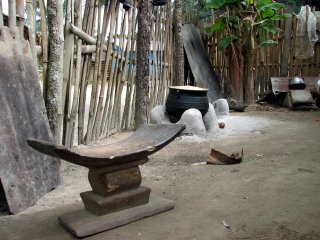 At night, after a wonderful dish of Groundnut Stew and pounded rice balls, I sit around singing with Emmanuel’s girls and their grandfather. Vida is off talking with her family so she misses her girls singing This Little Light of Mine, Tradin’ My Sorrows, and Shout to the Lord. They bring out a hymn book and we find songs to sing like I Surrender All, and Old Rugged Cross, and then their grandfather sings a verse in Twi, their local language. How fun. I wish I had a recording of this very African voice singing To God be the Glory, in Twi, with this honky-tonk guitar behind it.
At night, after a wonderful dish of Groundnut Stew and pounded rice balls, I sit around singing with Emmanuel’s girls and their grandfather. Vida is off talking with her family so she misses her girls singing This Little Light of Mine, Tradin’ My Sorrows, and Shout to the Lord. They bring out a hymn book and we find songs to sing like I Surrender All, and Old Rugged Cross, and then their grandfather sings a verse in Twi, their local language. How fun. I wish I had a recording of this very African voice singing To God be the Glory, in Twi, with this honky-tonk guitar behind it.
Then it is off to bed to await the roosters and community radio, bright and early, tomorrow morning.
See pictures from Day2
[1] Dr. Robert M. Shelton was my Sr. Preaching teacher, and later president of Austin Seminary (www.austinseminary.edu)
Labels: Ghana, rural village

1 Comments:
I happened upon your blog today and I'm happy I did. In this public medium it isn't easy to pick your readers. I'm an American and live in Pennsylvania. I found your site through Technorati tags for Ghana. I like bridge blogs. You might like to know, or already know about Global Voices
Your stories are very warm and human. I believe it is a great benefit for people to understand themselves as people across cultures. This blog contributes to that.
Post a Comment
<< Home